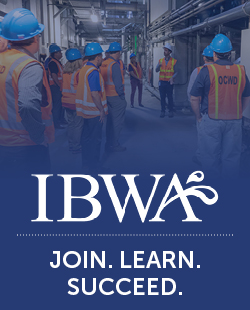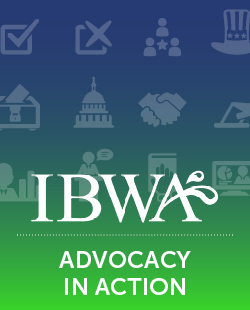Groundwater/Environmental Stewardship
Groundwater/Environmental Stewardship
Talking Points Communications Guidance for
Drought Conditions and Groundwater Resource Management
April 26, 2002
About This Document
This document provides IBWA members with talking points for responding to inquiries from policymakers, regulators, consumers and media about the bottled water industry’s position on groundwater resource management and actions related to drought and other water resource issues.
The high visibility of bottled water products being sold in containers tends to increase due to the drought situation in a number of states and communities across the United States. Compounding this problem is the lack of understanding of the crucial role bottled water plays in providing consumers with consistently safe, high quality water to drink, and the fact that bottled water withdrawals are but a fraction of water withdrawn from the ground compared to other commercial or industrial purposes.
This document provides a framework for IBWA members to respond to inquiries in a manner that reflects the policies and actions of the industry, IBWA and your company. As with all statements and claims, IBWA recommends that bottlers and others utilizing the content from this guidance document be prepared with substantiation and other support to demonstrate your statements.
What is a drought?
The U.S. Geological Survey (USGS), the National Weather Service and the National Drought Mitigation Service all utilize the following definition* of drought:
“Although it has scores of definitions, [drought] originates from a deficiency of precipitation over an extended period of time, usually a season or more…It is also related to the timing and the effectiveness of the rains (i.e., rainfall intensity, number of rainfall events). Other climatic factors such as high temperature, high wind, and low relative humidity are often associated with it in many regions of the world and can significantly aggravate its severity.”
“Drought is [a] normal, recurrent feature of climate, although many erroneously consider it a rare and random event. It occurs in virtually all climatic zones; although its characteristics vary significantly from one region to another. Drought is a temporary aberration and differs from aridity since the latter is restricted to low rainfall regions and is a permanent feature of climate.”
The bottled water industry concurs with this definition and emphasizes that droughts are a condition that occur on a cyclical basis and are natural occurrences that are based in rainfall amounts and the hydrogeologic cycle. Drought events are not sudden, overnight incidents, rather they are the culmination of factors that occur over time.
The bottled water industry applauds developments in science and technology that work to identify, mitigate and manage drought conditions and advocates this use of sound science for understanding and preparing policies for drought situations, rather than reaction in crisis mode that does not use science or rational policy to address the issue at hand.
Talking Points
What the bottled water industry is doing…
-
- Bottled water is the best and highest use of water: human consumption. Humans need water to survive and can rely on bottled water for safe, high quality and convenient water to drink. Water conservation results from the use of bottled water, which can be easily stored in a re-sealable bottle or accessed from a water cooler. This conserves water because all of the water is consumed.
-
- Water conservation must be a responsibility that is shared by all users of the resource. Before restrictions are placed on specific users, other water conservation measures, such as restrictions on watering lawns and washing cars, should be coupled with efforts to raise public awareness about the need to minimize non-essential home and business water use.
-
- Bottled water companies can and do voluntarily adjust non-essential water usage during times of drought. Some examples of this include reducing or stopping the washing of trucks and watering for landscaping, depending on the severity of the drought conditions.
-
- Bottled water producers use only a fraction of what other commercial and industrial water users consume to produce their goods.
-
- Before developing a spring source, a bottled water company conducts a comprehensive hydrogeological analysis to ensure that there is no adverse impact the spring, nearby water supplies or the health and vigor of related aquatic systems. This program includes, depending on the specific conditions of the area, test wells, sampling and pump tests.
-
- An on-going monitoring program provides data about the conditions of the aquifer and surrounding area, which may include aquifer water levels, climate changes, and the impact of pumping.
-
- Bottlers’ state permits for groundwater withdrawals and state drought management authority often include restrictions for water withdrawal in the event of serious drought conditions. Bottlers will adhere to those provisions and play their part in managing water withdrawals.
-
- Bottled water companies provide safe drinking water in times of need such as drought, floods and/or other natural disasters, emergency response, and other instances during which public water systems are not able to provide essential drinking water.
The bottled water industry’s commitment to water resource management and stewardship…
-
- The bottled water industry advocates and supports water resources planning and management that is based in sound science, provides equitable treatment of all current and prospective water users, and is multi-jurisdictional in recognition of the geological and geographical nature of aquifers and groundwater sources.
-
- Bottlers have a vested business interest in protecting both the quality and quantity of this renewable resource. The bottled water industry’s future depends on good stewardship of water resources.
-
- Bottlers have a long history of environmental stewardship and protecting groundwater resources and those of our neighbors.
-
- Bottled water use of groundwater is extremely small compared to other commercial and industrial users. The bottled water industry is dwarfed in size by other commercial uses that may return the water to the environment in a less than acceptable form.
-
- Bottlers use water for its highest and most important use – human consumption in its purest form.
-
- The bottled water industry takes pride in the strong record that we have earned for responsibly managing spring sites. Environmental stewardship is not only the right thing to do; it is also in our best long-term interests to do business in a conscientious manner. Indeed, protecting groundwater resources is a part of our mission:
“Our commitment, as a member of IBWA, is to provide our consumers with high quality bottled water. To assure them a safe and plentiful water supply, we are dedicated to responsibly managing our renewable resources using sound science and environmental stewardship, with no adverse impact on the source, the surrounding environment, or our neighbors.”


